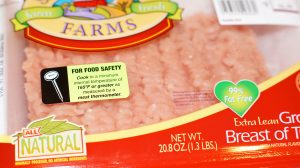Thanksgiving is a powder keg — jetlagged, hangry family members, cramped quarters, and spirited political debates with Uncle Bob palpably elevate the tension. You pray he succumbs to the post-gorge turkey coma (PSA: tryptophan doesn’t induce sleepiness) before going on a circular rant in your general direction. It’s the same predictable formula every year (at least, on most normal years). What should be a joyous gathering instead inspires dread — will he disown you for the umpteenth time?
Amid bountiful spreads like these, what also seems to be getting disowned is modern ag, if mainstream media and influencers have anything to say about it. Our gastronomic sensibilities are constantly challenged by campaigns that reject the “unnatural.” Natural implies untouched, unscathed — and healthy and wholesome — suggesting that any human intervention is corrupting compared to the baseline state. And that virtue signaling takes on heightened importance this time of year.
Some of that messaging is starting to chip away at your steady, rational façade. After all, you want to prepare a game-changing feast for your loved ones who are part of your inner circle. You want to demonstrate how attuned you are to their woke needs — and become legendary in the annals of Thanksgiving. Time to do some rigorous internet “research.”
Where to begin? Perennial provocateur the Environmental Working Group (EWG) released its Stress-Free Thanksgiving Menu in 2018, imploring consumers to choose organic/vegan alternatives to classic Thanksgiving dishes, and dirty” vegetables contaminated with pesticides. It’s a clever addendum to their yearly Dirty Dozen and Clean Fifteen reissues — an expose on the supposed dangers of pesticide residues in food — and their top picks to minimize exposure. It’s laughable, since it’d take hundreds of servings in a single sitting to maybe cause a pesticide-induced bellyache. One would think your bowels would be pleading for mercy long before that.
But you can’t talk Thanksgiving without talking turkey. The agenda-driven Menu harps about fowl “tainted with antibiotic-resistant bacteria.” Never mind that turkeys occasionally get sick and need to be treated. The alternative is to withhold treatment. How does that model square up with demands for animal welfare? Antibiotics are also used to promote growth, enhancing how feed is converted to pack on pounds.
And speaking of pounds, turkeys have been bred to weigh more than twice that of the 1930s. Turkeys are bigger thanks to genetics, not hormones. Yet you’ll often see social media chatter about second-hand hormones causing early onset puberty in girls (never mind better diets and general health — and hormones are extremely particular about what species they “work” on). Despite that, you’ll often see packaging indicating that meat was raised without hormones. While this marketing maneuver is dubious but legal, an accompanying statement must also be present: “Federal regulations prohibit the use of hormones.” Some minor truth in labeling consolation.

So back to the original question: What is natural? If we build an ag innovation timeline, the dawn of pesticides predated the Pilgrims by about 4,000 years. Pesticides are hardly new, but they are much safer, more targeted, and less persistent in the environment. And they keep voracious pests and pathogens in check — those that wouldn’t hesitate to be Thanksgiving killjoys. As far as they’re concerned, first come first serve.
Biotechnology (in the broadest sense, including selective breeding) had its origins nearly 9,500 years BPR (Before Plymouth Rock). The era of recombinant DNA technology — aka GMO-inspired cutting and pasting of DNA from one organism into another — was already well underway in nature, compliments of Agrobacterium and various viruses. Sweet potatoes, an old Thanksgiving staple, were genetically engineered with bacterial genes long before we even knew about DNA. If nature set the inspirational standard, then we should embrace human refinements!
These examples all provide perfect fodder for a civil dialogue at the dinner table. From overpriced, boutique organic, to TV dinners, our food system is remarkably safe and nutritious; and we have modern agriculture to thank. In particular, this includes the 1.5 percent of the population — the farmers and ranchers — who have willingly assumed the mantle of production. And why shouldn’t they? They literally have it down to a science.
But the natural narrative is seductive, with a rabid fanbase. Choose your chic labeling verbiage: organic/biodynamic, or pesticide, hormone, antibiotic, and GMO-free! After all, why have a Nissan when you can gallivant around the neighborhood with the food brand equivalent of an Infiniti?
It’s like the self-professed naturalytes (certainly not limited to EWG) see themselves as modern-day eco-Pilgrims — a breakaway faction that oozes the true intent of the gospel.
We have a love/hate affair with modernity. Just when we get comfy, certain elements start to question the wisdom of our insulative bubble (built off the foundations of ag). “Roughing it” was precisely what the Pilgrims tried — and it failed spectacularly. After the survivors regrouped (with help from Native Americans), they celebrated their newfound success at the first Thanksgiving.
All natural or bust? Pious devotion doesn’t mean we should embrace crippling inefficiency to satisfy meaningless purity. Natural is a fiction that hasn’t existed since the age of hunter gatherers. And it does a grave disservice to the memory of Pilgrims who suffered immeasurably before getting their agricultural house in order.
In addition to a reverence for God, family, and country, be sure to celebrate the contributions of farmers as part of your multicourse Thanksgiving meal. Modern day hacks make your life infinitely better.
Tim Durham’s family operates Deer Run Farm — a truck (vegetable) farm on Long Island, New York. As an agvocate, he counters heated rhetoric with sensible facts. Tim has a degree in plant medicine and is an Assistant Professor at Ferrum College in Virginia.



